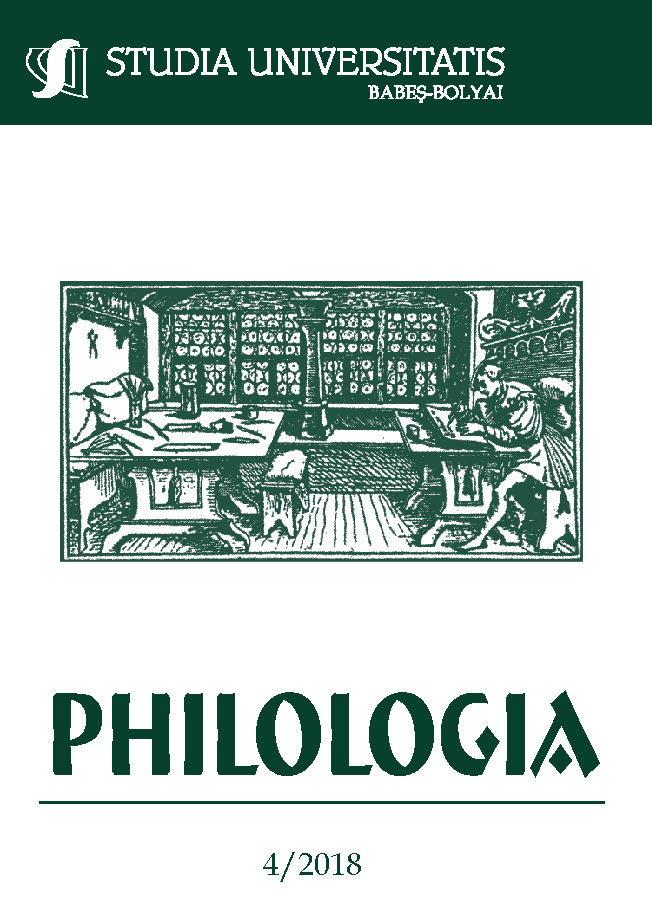ON “MAKING ODDKIN” IN SARA BAUME’S “SPILL SIMMER FALTER WITHER”
DOI:
https://doi.org/10.24193/subbphilo.2018.4.08Keywords:
Sara Baume, Gothic, companion species, Donna Haraway, oddkin, Jacques Derrida, l’animot.Abstract
On “Making Oddkin” in Sara Baume’s Spill Simmer Falter Wither. This study argues that in its figuration of the protagonist’s complex engagement with the dog that enables him to articulate his autobiographical self, Sara Baume’s 2015 novel Spill Simmer Falter Wither adopts a critical posthumanist stance on the abyssal rift conventionally understood to separate human and non-human animals. Tapping the potential for dismantling the anthropocentric mindset, the odd kinship Ray forms with One Eye becomes a way of disrupting essentialist conceptions of selfhood and articulating alliances that catalyse the narrator’s reconciliation with personal trauma and his ethically responsible repositioning in the world at large.
Rezumat. “Înrudiri bizare” în romanul “Spill Simmer Falter Wither” de Sara Baume. Argumentul studiului de față este acela că prin configurarea unei relații de ordin simbiotic între câine, ca specie de companie, și protagonist, ca animal autobiografic, romanul Spill Simmer Falter Wither (2015) de Sara Baume se raliază unei poziții critic-postumaniste asupra faliei abisale care, în mod conventional, trasează linia de demarcație între uman și nonuman. Având potențialul de destabilizare a mentalității antropocentrice, straniile alianțe dintre Ray și One Eye devin o modalitate de bruiere a concepțiilor identitare esențialiste, proximitatea animalului catalizând reconcilierea naratorului cu trauma personală și repoziționarea sa etic-responsabilă în lume.
Cuvinte cheie: Sara Baume, ficțiunea gotică, creaturile de companie, Donna Haraway, stranii alianțe, Jacques Derrida, l’animot
References
Backus, Margot Gayle. 1999. The Gothic Family Romance. Heterosexuality, Child Sacrifice and the Anglo-Irish Colonial Order. Durham and London: Duke University Press.
Baume, Sara. 2015. Spill, Simmer, Falter, Wither. London: William Heinemann.
Baume, Sara. 2016. “Q&A with Sara Baume”. The Desmond Elliott Prize website. http://www.desmondelliottprize.org.uk/qa-sara-baume/
Clarke, Alex. 2017. “Interview. Sara Baume: ‘I always wanted to be an art monster’”. The Guardian. (18 February). https://www.theguardian.com/books/2017/feb/18/sara-baume-interview-a-line-made-by-walking
Derrida, Jacques. 2008. The Animal That Therefore I Am. Edited by Marie-Luise Mallet. Translated by David Wills. New York: Fordham University Press.
Duncan, Ian. 2010. Modern Romance and Transformations of the Novel. The Gothic, Scott, Dickens. Cambridge: Cambridge University Press.
Estévez-Saá, Margarita. 2018. “All We Shall Know”. Estudios Irlandeses, Issue 13, March 2018-Feb. 2019, 213-215.
Haraway, Donna. 2003. The Companion Species Manifesto: Dogs, People, and Significant Otherness. Chicago: Prickly Paradigm Press.
Haraway, Donna. 2004. The Haraway Reader. New York and London, Routledge.
Haraway, Donna. 2016. Staying with the Trouble. Making Kin in the Chthulucene. Durham and London: Duke University Press.
Magennis, Caroline. 2015. “Spill, Simmer, Falter, Wither. Book review”. Times Higher Education Supplement. (17 September), 45.
O’Connor, Joseph. 2015. “Fiction with friction, jaggedness, juice”. Irish Times. (7 February), 11.
Oliver, Kelly. 2009. Animal Lessons. How They Teach Us to Be Human. New York: Columbia University Press.
Wolfe, Cary. 2008. What Is Posthumanism? Minneapolis and London: University of Minnesota Press
Downloads
Published
How to Cite
Issue
Section
License
Copyright (c) 2018 Studia Universitatis Babeș-Bolyai Philologia

This work is licensed under a Creative Commons Attribution-NonCommercial-NoDerivatives 4.0 International License.



